index memoir - homepage - contact me at
We, with our two children, left Doncaster, moved south, and found a room in a guest house at Westcliffe on Sea near South End run by a friendly Cockney couple at £11 per week – the company paid £9 of this. We had to eat out for evening meals and our savings slowly dwindled.
It was a fairly warm summer and Cubby and the girls could spend much time outside when I was away from 7-30am to 7-30pm each day at the site at Purfleet. The flat stony beach, slot machine arcades, and winkle[1] vendors did not particularly excite us, but we enjoyed dancing at an open air venue, and Cubby brought a bathing costume and took a dip.
I reached Purfleet each day alighting from a train for commuters to London. On the site they were driving precast circular displacement piles in black peat soil and I started setting out driving positions in advance of the rigs. The peat, however, acted as a hydraulic medium and adjacent already driven piles popped up[2] several feet on occasion and these had to be re-driven.
I then moved across the Thames estuary to a building project starting in Kent at Aylesford working on the foundations for a large food factory for packaging supermarket[3] fare. It was foreseen that I would be transferred soon onto the construction of some Medway Motorway bridges[4] near Faversham and Sittingbourne - which indeed occurred after a month.
We attempted to move the whole family by train across the Thames estuary on a Saturday directly from Essex via London to Kent, hoping to find temporary accommodation in a local hotel. But failed, there was no room at the inns, and we retreated to London where friends Susan and John, after putting us up for a night, helped us find a small hotel near them in North Finchley. My family remained there for a week while I started the factory site and rented a ‘summer’ cottage Suncot on the outskirts of Whitstable (of oyster fame) into which we moved directly. The only snag was that the owners occupied the cottage for a month during their summer holidays and during this period we had to move to pleasant Crestly Guest House, on the coast close to Whitstable.
We had come up in the world, Suncot had an indoor flushing lavatory, a refrigerator, a hired black and white[5] television set (taken over from the summer sojourners), a fine rambling overgrown garden, and a third bedroom to put up visiting friends and family. The house was altogether delightful in the summer months, but heating by coal fire was primitive, central heating radiators had not been provided and in winter our breath condensation froze on the single glazed windowpanes.
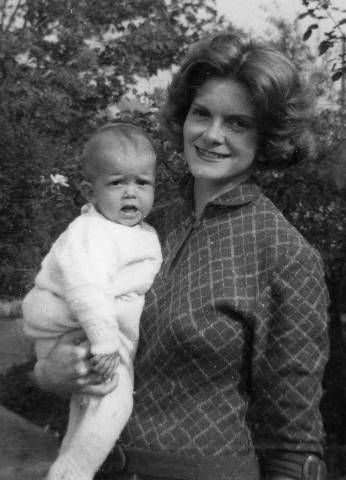 |
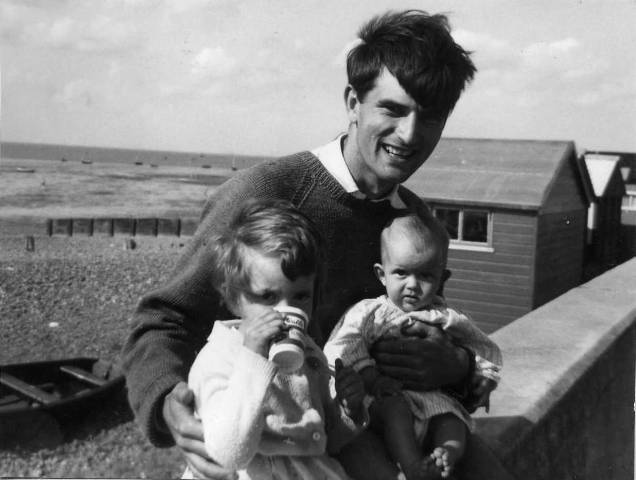 |
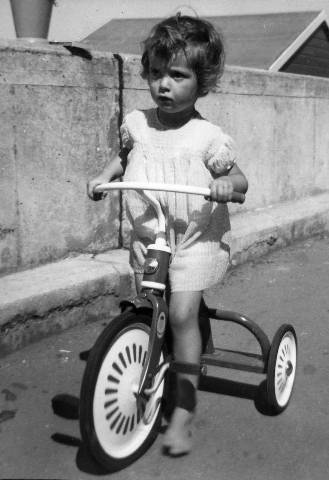 |
Cubby with Karen in Suncot Cottage's sunny garden - me with Nicky and Karen with Whitstable's pebbly beach behind - Nicky on tricycle |
||
The beach, despite the stony pebbles boring into ones bare feet, was pleasanter than the other side of the river. There were no pleasure esplanades with slot machines to annoy – here it was back to nature. We saw flocks of sailing dinghies out on the water - one was crewed by a South African friend Jeff who still worked at Ove Arup in London and frequently came down over weekends. Other London day-trippers amused us walking on the beach or paddling in the sea - stripped to their vests, with rolled up trousers or skirts tucked in bloomers like Indian dhotis - white flesh turning a choleric red in the sun.
Many of the engineers on the project in Yorkshire had also been transferred to this project and we thus had instant friends and regular dinner parties. London friends Susan and John with their children also visited for the weekend, as did our French holiday companions Jim and Liz.
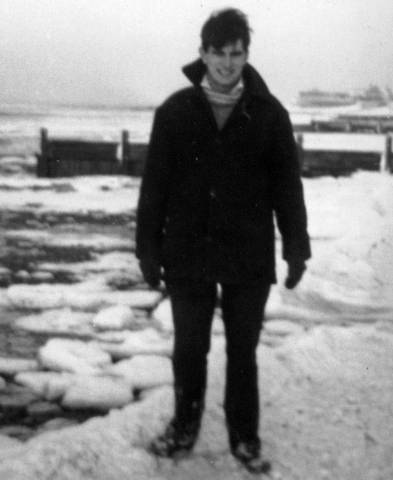 |
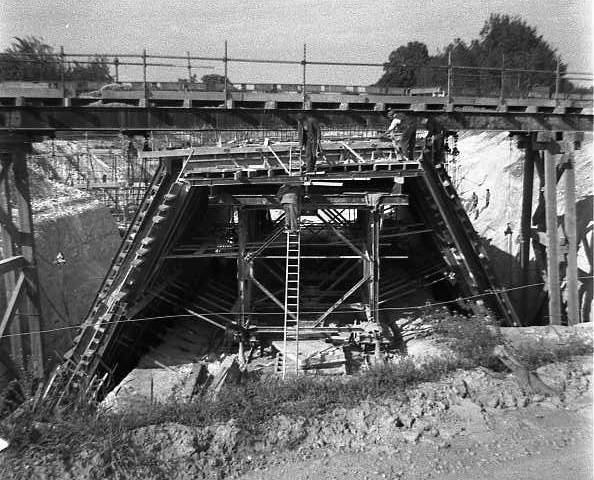 |
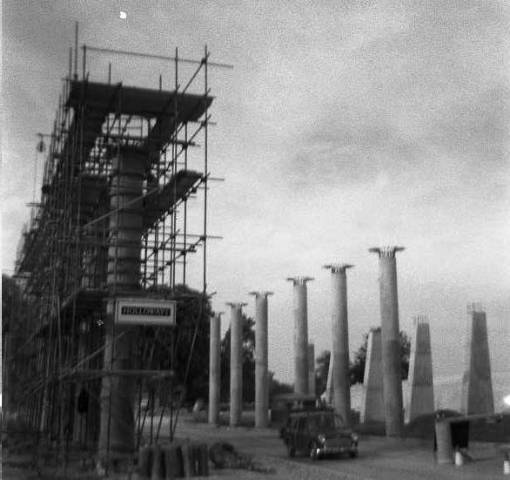 |
Me standing in front of frozen Whitstable seafront - culvert type bridge under construction (gantry used for handling formwork & for transporting concrete) - another bridge under construction. |
||
The job proceeded generally uneventfully except for one incident. In order to get a good start on a large strip footing for a bridge we placed some loads of ready mixed concrete first thing in the morning before intending continuing mixing our own concrete on site. We had not anticipated the severity of the weather – a freezing cold wind had blown overnight from Siberia and the sand and aggregates had frozen in their stock heaps – they could not be handled and weighed and our gas flame space heaters were insufficient to thaw them. The concrete pour had to be abandoned. 10 cubic meters of rapidly hardening concrete was hacked out taking a week to do and the reinforcing bars reclaimed.
My foreman on one of the bridges was a friendly and conscientious West Indian, the first I had met in England. I could not help but contrast him with our English Site Office Manager who was blatantly racist and continually complained about all the blacks coming into England and taking ‘their’ jobs. He appeared ignorant of the Colonial British Empire and wealth arising in part in Britain from the exploitation of slaves on Sugar estates in the West Indies.
Cubby’s parents, on route to Copenhagen from South Africa where he had been based since 1937, stayed at Suncot in late October 1961 and saw both our daughters. Aage had worked from 1956 in Cape Town as the Manager of Christiani and Nielsen, South Africa, and had been recalled to Copenhagen as a director of overseas projects. We in turn visited them in March 1962, crossing by ferry from nearby Dover to Ostende and journeying on by train to Copenhagen sitting up all night largely sleepless on uncomfortable leather seats. Our second daughter Karen was duly christened in the Engelske Kirke, the Anglican Church on Langelinie just south of the ‘Little Mermaid’ on the harbour edge.
We went walking in Dyrehave just north of Copenhagen when about ¼ mile ahead of me I saw a familiar figure whose back view I identified as one of my fellow students Robin at Cape Town University. Cubby considered this as being most unlikely – why should he be in Denmark and in any case how could I see from that distance? Despite this we hurried to catch him up and surprisingly found that it was indeed Robin on holiday in Copenhagen.
During this visit the possibility of working on a project in Pakistan was raised if Christiani and Nielsen tender was successful, and I expressed interest. Cubby returned to England a few weeks after me meeting my sister Judy returning from Antwerp on the same ferry. Judy had earlier moved there from London and again studied art in the evening. After some weeks with us at Suncot Judy sailed back home to Cape Town.
|
|
|
|
Nicky and Karen resting - Our children with Angus in pram in Suncot garden - my sister Judy en route back to Cape Town after a period in Antwerp working and studying art. |
||
Dr Verwoed[6], South Africa’s Prime Minister and architect of many of the most oppressive aspects of Apartheid, had implemented a Republic on 31st May 1961, and South Africa had in effect been expelled from the Commonwealth. South Africans were no longer British Subjects. We then applied for and were registered as United Kingdom Citizens in October 1961 despite our erratic series of addresses in England. We obtained British passports, as South African nationality[7] would have made travel to many parts of the world difficult if not impossible - and we intended to travel the world wherever my work took me.
Christiani and Nielsen obtained the job in Pakistan and I gave notice to Holloway Brothers who had recently been absorbed by the larger construction company John Laing[8]
[1] Small sea snails
[2] Bored or non-displacement piles would have been a preferable solution. I later encountered a similar problem in Baghdad in Iraq
[3] Possibly the start of the British Supermarket era but we did not come across any before leaving England
[4] I travelled on this completed motorway 30 years later when coming from Paris by ferry (the channel tunnel was not yet opened). I was surprised to find that the motorway was only two lanes in either direction and that it petered out before London.
[5] Colour television came in at a later era
[6] Not a South African born Afrikaner, he had actually been born in Holland and emigrated with his parents.
[7] South Africans were undesirable visitors to many countries abhorring their racial policies.
[8] One of the few British construction companies surviving under their own name for the next 40 years
index memoir - homepage - contact me at